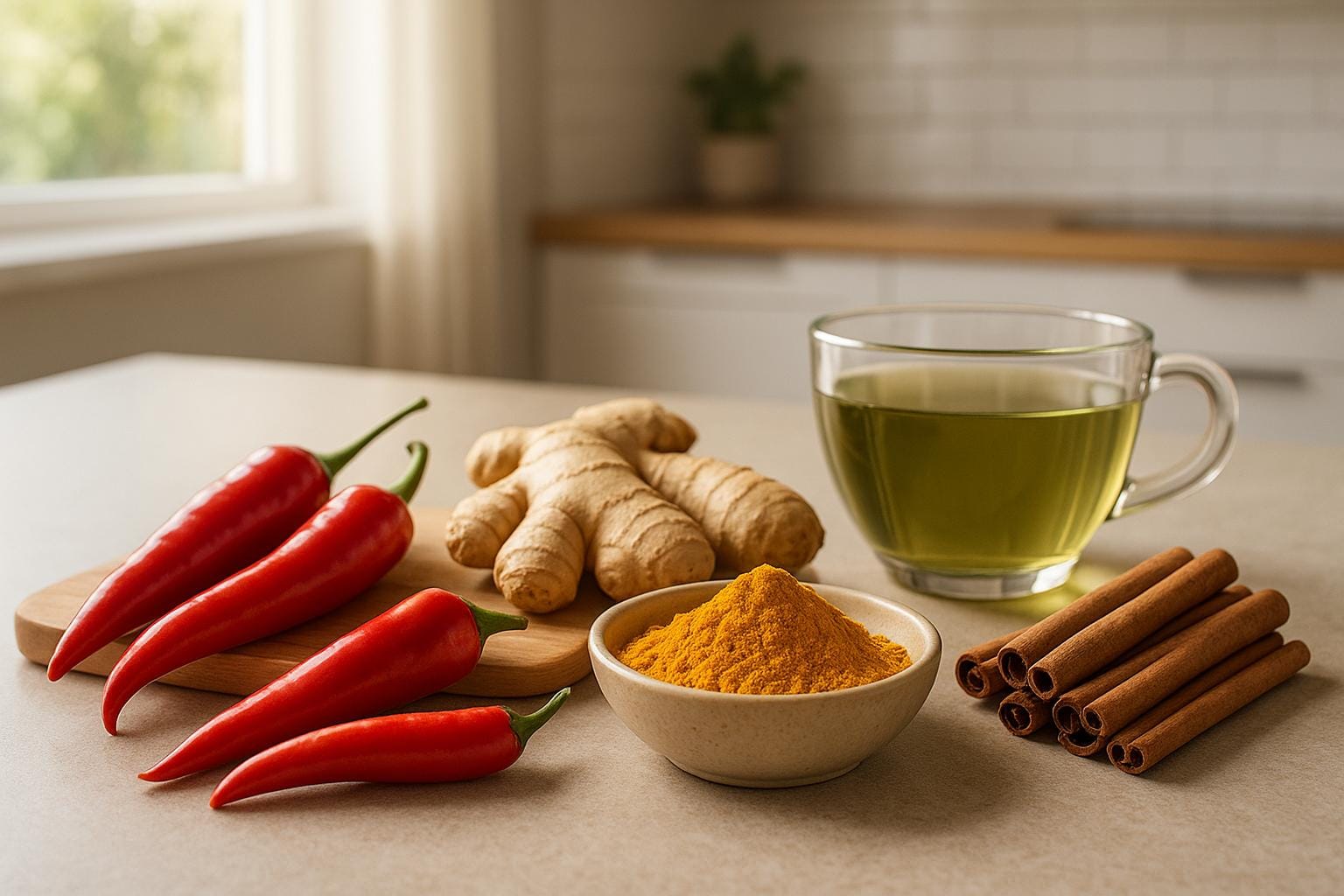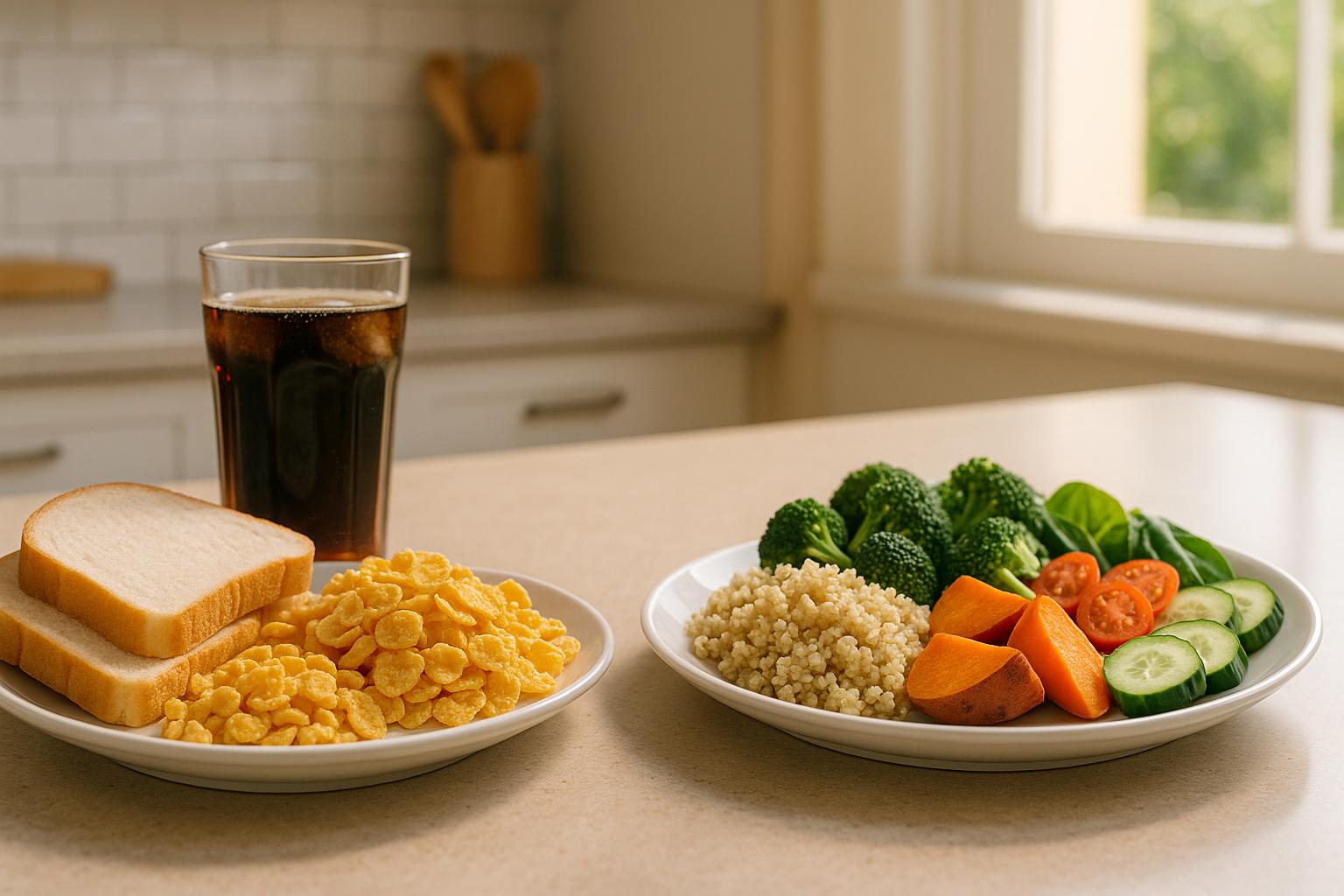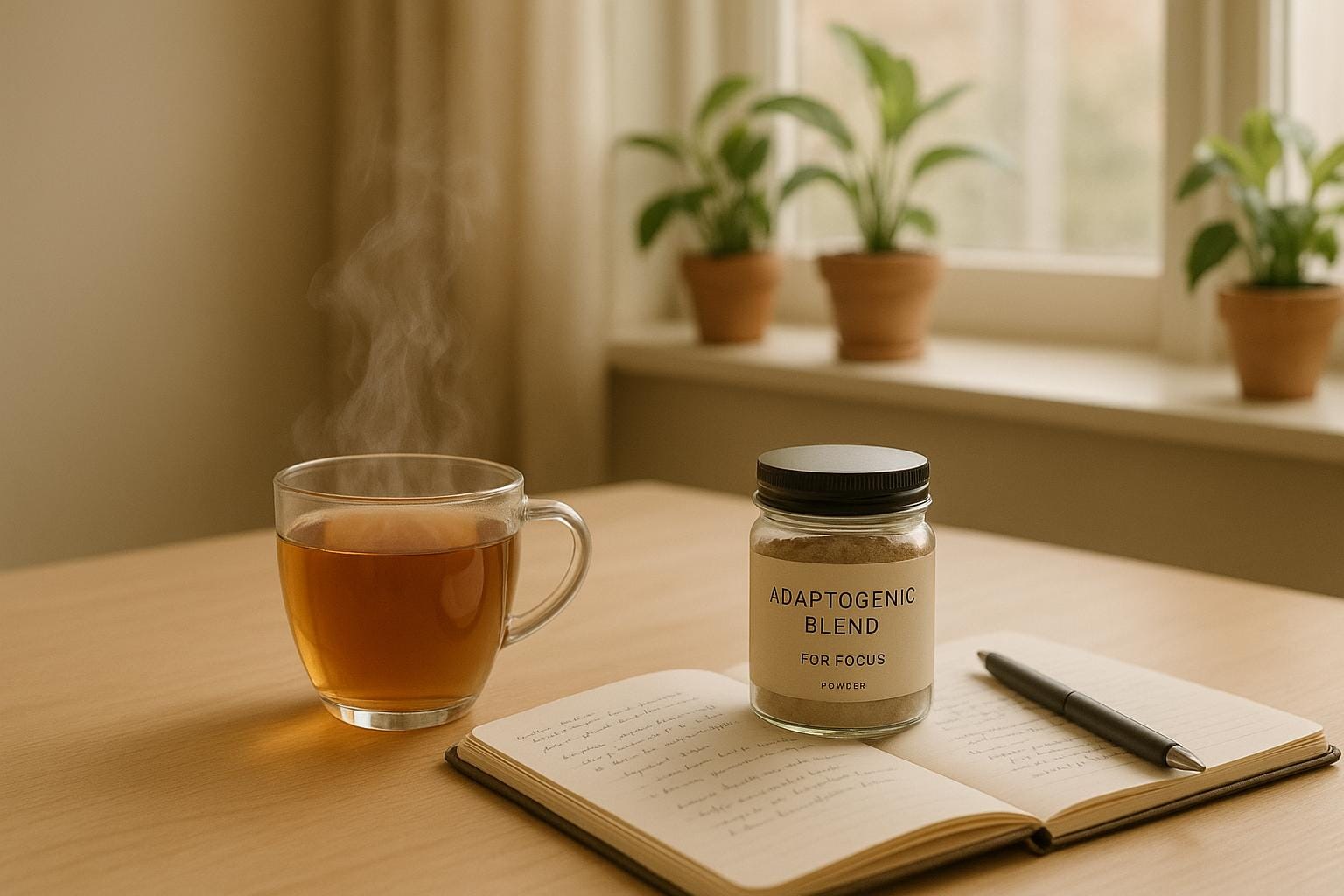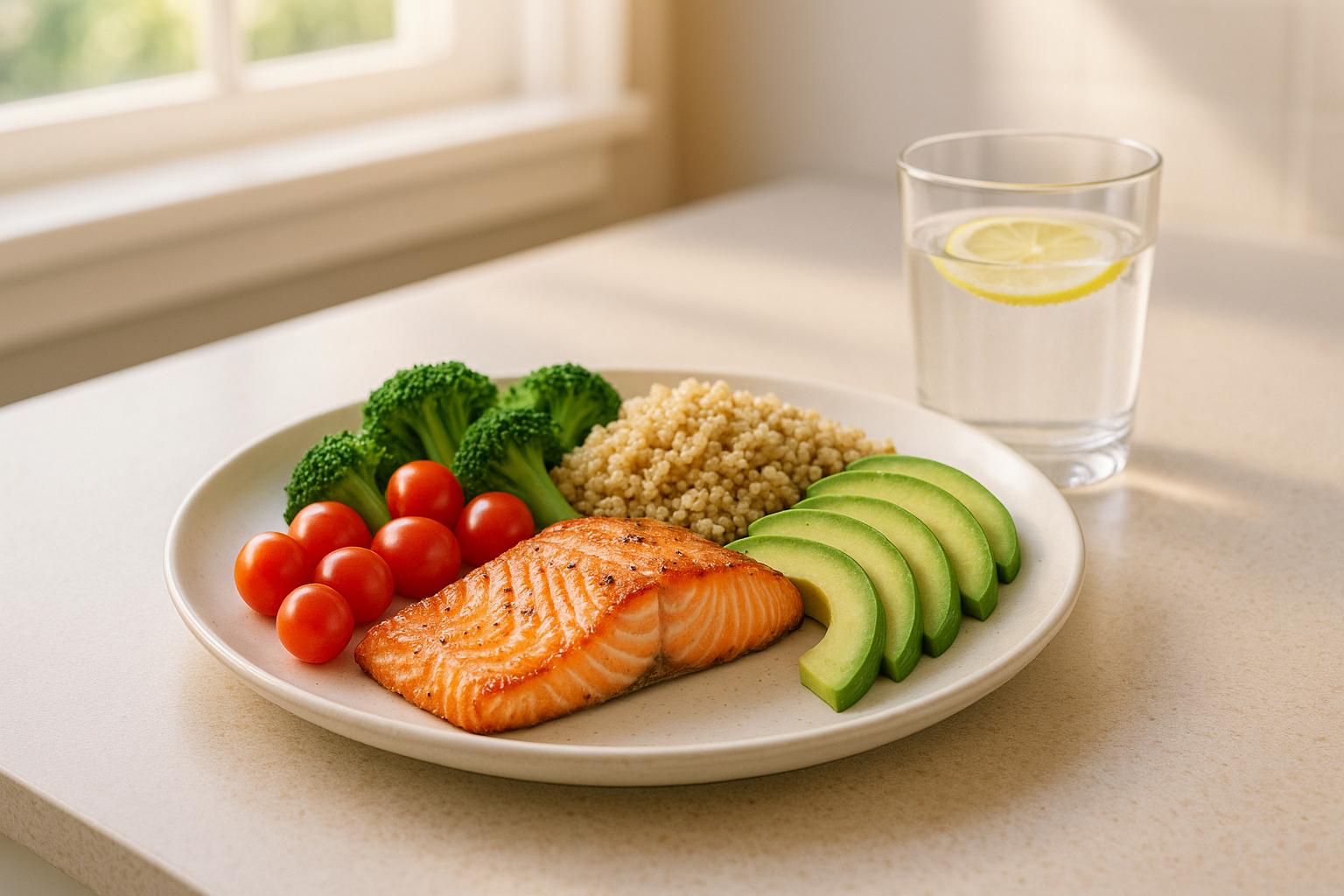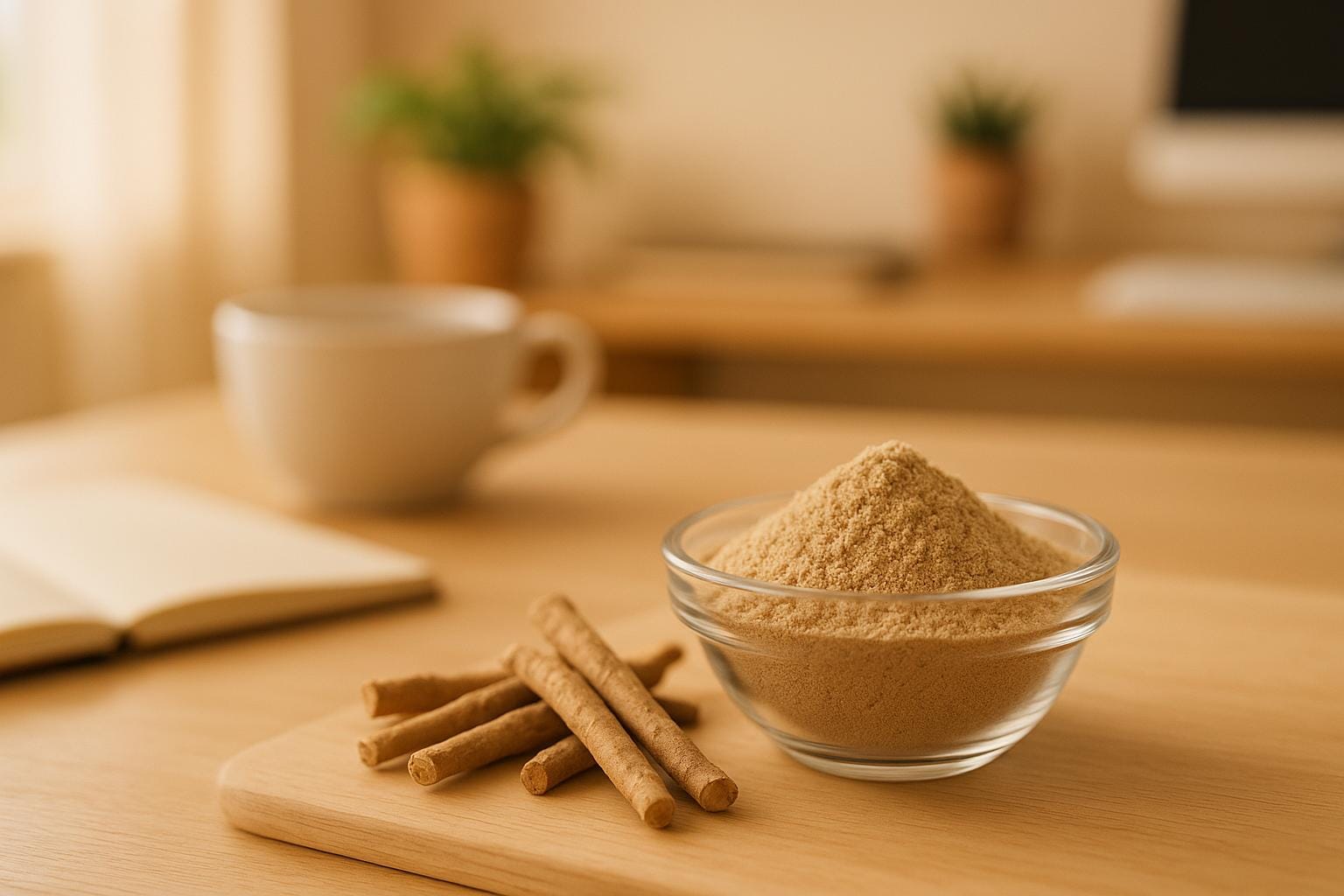What you eat can reduce stress and inflammation. Certain foods help regulate stress hormones, support a healthy gut, and ease inflammation. Here's what you need to know:
- Key nutrients: Omega-3s (fatty fish, walnuts), antioxidants (berries, leafy greens), polyphenols (green tea, dark chocolate), and fiber (whole grains, legumes).
- Stress hormone support: Foods like salmon, berries, and green tea help stabilize cortisol levels.
- Best choices: Bright fruits and vegetables, healthy fats (avocados, olive oil), and anti-inflammatory spices like turmeric and ginger.
Start small: Add berries to breakfast, sip green tea, or swap processed snacks for nuts. These simple changes can help you feel calmer and healthier over time.
How Anti-Inflammatory Foods Work
Key Nutrients That Fight Inflammation
Anti-inflammatory foods contain nutrients that help reduce inflammation by addressing its root causes.
- Omega-3 Fatty Acids: Found in fatty fish, walnuts, and flaxseeds, these fats work by lowering inflammatory proteins and increasing compounds that counteract inflammation.
- Antioxidants: Brightly colored fruits and vegetables are packed with vitamin C, vitamin E, and beta-carotene, which neutralize free radicals that can trigger inflammation.
- Polyphenols: Found in berries, green tea, and dark chocolate, these compounds help reduce oxidative stress and strengthen the body’s natural defenses.
- Fiber: Foods high in fiber promote healthy gut bacteria, which play a role in managing inflammation.
These nutrients also contribute to regulating stress hormones, offering additional support for overall balance.
Impact on Stress Hormones
The nutrients in anti-inflammatory foods help stabilize stress hormones like cortisol. For example, vitamin C and omega-3 fatty acids are known to support cortisol regulation, making it easier to manage stress.
Combining anti-inflammatory eating with mindful practices can amplify its benefits. As fitup highlights:
"This beginner's guide explains the fundamentals of mindfulness meditation, providing step-by-step instructions and practical tips that will help you experience its significant benefits for health, happiness, and overall well-being."
Incorporating activities like yoga and meditation alongside an anti-inflammatory diet can further support both physical and mental wellness.
This article is for informational purposes only and is not intended as medical advice. Please consult a healthcare professional before starting any new fitness or wellness routine.
EAT THESE FOODS To End Inflammation & Reduce Stress ...
Best Foods to Reduce Inflammation
Here’s a breakdown of foods that pack nutrients to help manage inflammation effectively.
Fruits and Vegetables That Help
Deep-colored fruits and vegetables are loaded with compounds that fight inflammation:
- Berries: Blueberries, strawberries, and blackberries are rich in anthocyanins, which help combat oxidative stress.
- Leafy Greens: Kale, spinach, and Swiss chard are great sources of magnesium, which plays a role in managing stress.
- Bright Vegetables: Sweet potatoes, carrots, and bell peppers provide beta-carotene and vitamin C, both known to help reduce inflammation.
Adding healthy fats to your meals can also support your body’s natural balance.
Healthy Fats to Include
- Wild-Caught Fish: Salmon, mackerel, and sardines are excellent sources of omega-3 fatty acids (EPA and DHA), known for their anti-inflammatory properties.
- Plant-Based Options: Avocados, extra virgin olive oil, walnuts, and chia seeds are packed with monounsaturated fats and omega-3s, which can help regulate stress hormones.
Spices and Drinks That Make a Difference
Certain spices and beverages can complement your diet in reducing inflammation:
-
Spices:
- Turmeric (best when paired with black pepper)
- Fresh or dried ginger
- Ceylon cinnamon
- Rosemary
- Oregano
-
Drinks:
- Green tea
- Tart cherry juice
- Golden milk (turmeric latte)
- Chamomile tea
Incorporating these foods, spices, and beverages into your daily meals can help support your body’s response to inflammation and reduce stress.
Note: This information is for educational purposes and should not replace professional medical advice. Always consult a healthcare provider before making changes to your diet or wellness routine.
Daily Anti-Inflammatory Meal Plan
Use ingredients known to reduce inflammation to create meals that help combat daily stress. A well-rounded meal plan can make a big difference in promoting relaxation and well-being.
Quick Anti-Inflammatory Breakfasts
Start your day with these simple, nutrient-rich breakfasts you can whip up in under 15 minutes:
- Berry Oatmeal Bowl: Combine ½ cup steel-cut oats with blueberries, strawberries, 1 tablespoon ground flaxseeds, and a drizzle of honey.
- Green Smoothie: Blend 2 cups spinach, 1 banana, ½ cup mixed berries, 1 tablespoon ground flaxseeds, and unsweetened almond milk.
- Turmeric Yogurt Parfait: Layer Greek yogurt with a sprinkle of turmeric, honey, and mixed berries. Finish with ¼ cup walnuts for crunch.
Main Meal Options
Lunch Ideas:
- Mediterranean Bowl: Combine leafy greens, cherry tomatoes, cucumber, and chickpeas with cooked quinoa. Add grilled chicken or fish and drizzle with extra virgin olive oil and lemon juice.
- Lentil Soup: Prepare a hearty soup with red lentils, turmeric, ginger, and a mix of vegetables for a comforting, nutrient-packed dish.
Dinner Ideas:
- Ginger-Turmeric Salmon: Season a 6-ounce salmon fillet with fresh ginger, turmeric, and black pepper. Pair it with roasted sweet potatoes and steamed broccoli for a balanced meal.
Snacks That Keep Stress in Check
Stay energized between meals with these quick, anti-inflammatory snacks:
- Apple with Almond Butter: Slice a medium apple and enjoy with 2 tablespoons of almond butter.
Making Anti-Inflammatory Eating a Habit
You can gradually shift your diet to include more anti-inflammatory foods, which may help manage stress and support overall well-being.
Simple Steps to Get Started
Start small to create habits that stick. For example, swap your white toast for whole-grain bread topped with fresh berries. Instead of reaching for processed snacks, try a handful of walnuts paired with apple slices.
Focus on adding nutrient-packed foods to your meals rather than cutting things out entirely. These small, steady changes can help you build a diet that’s easy to maintain over time.
This article is for informational purposes only and does not replace medical advice. Always consult a healthcare professional before making changes to your fitness or wellness routine.
Conclusion: Using Food to Reduce Stress
Incorporating thoughtful food choices into your daily meals can play a big role in managing stress. Anti-inflammatory foods, in particular, offer a practical way to support your well-being while easing stress.
Start small by adding one anti-inflammatory ingredient to each meal. For instance, toss some berries into your breakfast or add leafy greens to your lunch. Simple swaps like sipping green tea instead of coffee can also help your body adjust and respond better to stress over time.
To keep things interesting and sustainable, experiment with different ingredients. Add colorful fruits and vegetables to your dishes, try spices like turmeric, or include healthy fats such as avocados and olive oil. When your meals are both enjoyable and nourishing, sticking to these changes becomes much easier.
By making gradual, intentional dietary adjustments, you can build habits that benefit both your body and mind. Each step toward eating more anti-inflammatory foods helps improve your stress management and overall health.
This article is for informational purposes only and is not intended as medical advice. Please consult a healthcare professional before starting any new fitness or wellness routine.
FAQs
How can anti-inflammatory foods help lower stress levels?
Anti-inflammatory foods can help reduce stress by supporting your body’s ability to manage inflammation, which is often linked to chronic stress. Foods like leafy greens, berries, nuts, and fatty fish are rich in antioxidants and omega-3 fatty acids that help regulate stress hormones and improve brain health.
In addition, these nutrient-dense foods promote overall well-being by stabilizing blood sugar levels, boosting mood, and reducing physical symptoms associated with stress, such as fatigue and tension. Incorporating these foods into your diet can be a simple yet effective way to support both your mental and physical health.
How can I easily add anti-inflammatory foods to my daily routine?
Incorporating anti-inflammatory foods into a busy lifestyle can be simple with a few practical tips. Start by stocking up on versatile staples like fresh fruits, vegetables, nuts, and whole grains. These ingredients are easy to include in meals or snacks, even when you're short on time.
Consider prepping meals in advance, such as making a batch of salads, soups, or grain bowls packed with anti-inflammatory ingredients like spinach, sweet potatoes, turmeric, or salmon. For quick snacks, keep options like almonds, blueberries, or avocado on hand.
If you're dining out or grabbing food on the go, look for dishes with lean proteins, plenty of vegetables, and healthy fats like olive oil. Small, consistent changes can make a big difference in reducing inflammation and supporting your well-being.
Can anti-inflammatory foods fully replace techniques like meditation or exercise for managing stress?
Anti-inflammatory foods can play a significant role in reducing stress by lowering inflammation in the body, which is often linked to stress-related conditions. However, they are not a complete replacement for other stress management techniques like meditation, exercise, or proper sleep. These methods work together to support overall well-being.
Incorporating a balanced diet rich in anti-inflammatory foods, such as leafy greens, fatty fish, and nuts, alongside regular physical activity and mindfulness practices, can create a more holistic approach to managing stress effectively.



